“Houston, we’ve had a problem.”
Notable sayings from prominent alumni provide a unique perspective on the UW’s impact on the world.
When On Wisconsin Magazine asked Fred Shapiro, the editor of the Yale Book of Quotations (or YBQ, Yale University Press), to compile some of the most famous quotes uttered by University of Wisconsin alumni and faculty, Shapiro was surprised by how many he found. The UW is remarkable for the achievements of its most prominent alumni, he says, “the more so because Wisconsin is a smaller state that outshines many larger states in this regard. Only California and Michigan are its peers.”
Shapiro also found an extraordinary breadth in the contributions reflected in those quotes. “The University of Wisconsin,” he says, “with a stunning range of departments and professional schools, has produced notable government officials, activists, social scientists and academics, writers and other artists, scientists and technologists, explorers, businesspeople, athletes, and entertainers — to name only some of the categories.”
Shapiro, who also serves as a librarian at Yale, created the YBQ in an attempt to update standard quotation references by using state-of-the-art research to trace the origins of quotes more accurately. For this story, he included quotes that grace the pages of the YBQ, as well as additional Badger words of wisdom that he compiled in his research.
— Editors
The Punchline of Many Jokes
The saying that is clearly the UW’s most famous, like a lot of quotations, has been altered somewhat by popular culture. In the 1995 movie Apollo 13, actor Tom Hanks, playing Jim Lovell, spoke it as, “Houston, we have a problem.” The Apollo 13 command module pilot, Jack Swigert, actually preceded Lovell’s line by saying, “Hey, we’ve got a problem here. … Okay, Houston, we’ve had a problem here.” The original quote as uttered by the real Jim Lovell was:
Houston, we’ve had a problem.
Jim Lovell x’50 (astronaut), transmission on Apollo 13 mission to the moon (April 13, 1970)
Reflections on Government
A sizable number of UW quotes reflect the Wisconsin Idea, first formulated in 1904 by UW President Charles Van Hise: “I shall never be content until the beneficent influence of the University reaches every home in the state.” In the early twentieth century, the university worked closely with both state and federal government, as expert professors consulted with legislators to draft pioneering laws. Today, the Wisconsin Idea is used broadly to describe the university’s commitment to public service to Wisconsin and to the entire world.
Public service is most obviously found in the realm of government. Here Badgers have created a striking legacy in American history. Although that legacy is not restricted to any single political philosophy, many of the university’s graduates and faculty, reflecting the state of Wisconsin’s progressive history, have viewed government from a reformist perspective. They have championed peace and civil liberties:
Conflicting views may be expressed, must be expressed, not because they are valid, but because they are relevant. If they are responsibly entertained by anyone, we, the voters, need to hear them. … To be afraid of ideas, any idea, is to be unfit for self-government. Any such suppression of ideas about the common good, the First Amendment condemns with its absolute disapproval. The freedom of ideas shall not be abridged.
Alexander Meiklejohn (faculty member 1926–32, 1935–37, and founder of the UW’s Meiklejohn Experimental College), Free Speech and Its Relation to Self-Government (1948)
Every nation has its war party. It is not the party of democracy. It is the party of autocracy. It seeks to dominate absolutely. It is commercial, imperialistic, ruthless. … If there is no sufficient reason for war, the war party will make war on one pretext, then invent another.
Robert M. La Follette, Sr. 1879 (governor and senator from Wisconsin, third-party presidential candidate), The Progressive (June 1917)
The act of imposing one people’s morality upon another people is an imperial denial of self-determination. Once begun, there is no end of empire except war and more war.
William Appleman Williams PhD’50, faculty member 1957–68 (historian), America Confronts a Revolutionary World: 1776–1976 (1976)
This program [domestic spying by the National Security Agency] is breaking the law, and this president is breaking the law. Not only that, he is misleading the American people in his efforts to justify this program. How is that worthy of applause? Since when do we celebrate our commander-in-chief for violating our most basic freedoms, and misleading the American people in the process? When did we start to stand up and cheer for breaking the law? In that moment at the State of the Union, I felt ashamed.
Russ Feingold ’75 (senator from Wisconsin), statement on the U.S. Senate floor about warrantless wiretapping (February 7, 2006)
For the life of me, I cannot understand why the terrorists have not attacked our food supply because it is so easy to do.
Tommy Thompson ’63, JD’66 (former secretary of the Department of Health and Human Services and governor of Wisconsin), New York Times (December 4, 2004)
Words that Inspired Environmentalism
Badgers have also been pioneers in the environmental movement. No other university can claim three environmentalists as pivotal as the authors of these quotes:
When we try to pick out anything by itself, we find that it is bound fast by a thousand invisible cords that cannot be broken, to everything in the universe.
John Muir x1865 (naturalist and explorer), Journal (July 27, 1869)
A thing is right when it tends to preserve the integrity, stability, and beauty of the biotic community. It is wrong when it tends otherwise.
Aldo Leopold (faculty member 1933–48; conservationist and author), A Sand County Almanac (1949)
The economy is a wholly owned subsidiary of the environment, not the other way around.
Gaylord Nelson LLB’42 (governor and senator from Wisconsin; founder of Earth Day), Beyond Earth Day: Fulfilling the Promise (2002)
Signs of the Times
Other alumni have spoken memorably about social justice issues ranging from civil rights to feminism. Here is just a small sampling:
Though it be a thrilling and marvellous thing to be merely young and gifted in such times, it is doubly so — doubly dynamic — to be young, gifted, and black.
Lorraine Hansberry x’52 (playwright), writing to winners of a creative writing contest sponsored by Reader’s Digest and the United Negro College Fund, Negro Digest (August 1964)
Adults ask little boys what they want to do when they grow up. They ask little girls where they got that pretty dress. We don’t care what women do with their education.
Mary I. Bunting MS’33, PhD’34 (biologist and president of Radcliffe College), TIME (November 3, 1961)
The academy is not paradise. But learning is a place where paradise can be created.
bell hooks MA’76 (social critic, educator, and writer), Teaching to Transgress (1994)
Shaping the Social Sciences
Turning from political activism to the social and behavioral sciences, the UW has produced leading scholars in fields ranging from economics to history to psychology:
When we come to speak of the disadvantages of the modern system of freedom, that is to say, of competition, it occurs to us that the moral atmosphere of a race-course is not a wholesome one. Competition tends to force the level of economic life down to the moral standard of the worst men who can sustain themselves in the business community.
Richard Ely (faculty member, 1892–1925; and economist), An Introduction to Political Economy (1889)
What the Mediterranean Sea was to the Greeks, breaking the bond of custom, offering new experiences, calling out new institutions and activities, that, and more, the ever retreating frontier has been to the United States directly, and to the nations of Europe more remotely. And now, four centuries from the discovery of America, at the end of a hundred years of life under the Constitution, the frontier has gone, and with its going has closed the first period of American history.
Frederick Jackson Turner 1884, MA1888 (historian), “The Significance of the Frontier in American History” (1893)
The significance of man is that he is that part of the universe that asks the question, What is the significance of man?
Carl Becker 1896, PhD1907 (historian), Progress and Power (1935)
By the power elite, we refer to those political, economic, and military circles, which as an intricate set of overlapping cliques, share decisions having at least national consequences. In so far as national events are decided, the power elite are those who decide them.
C. Wright Mills PhD’42 (sociologist), The Power Elite (1956)
The Encyclopaedia Britannica devotes many columns to the topic of love, and many more to faith. But … poor little hope … is not even listed.
Karl Menninger ’14, MS’15 (psychiatrist), TIME (December 28, 1959)
What is most personal is most general. … The very feeling which has seemed to me most private, most personal, and hence most incomprehensible by others, has turned out to be an expression for which there is a resonance in many other people.
Carl Rogers ’24 (psychologist), On Becoming a Person (1961)
It is tempting, if the only tool you have is a hammer, to treat everything as if it were a nail.
Abraham Maslow ’30, MA’31, PhD’34 (psychologist), The Psychology of Science: A Reconnaissance (1966)
We should hang on to [the Panama Canal]. We stole it fair and square.
S.I. Hayakawa PhD’35 (faculty member, 1936–39; semanticist, and senator from California), Los Angeles Times (October 7, 1976)
Of Literature and the Arts
The study of social and human life is also pursued through literature, and here, too, Wisconsin has contributed notably:
A woman has got to love a bad man once or twice in her life, to be thankful for a good one.
Marjorie Kinnan Rawlings ’18 (novelist), The Yearling (1938)
Never think you’ve seen the last of anything.
Eudora Welty ’29 (writer), The Optimist’s Daughter (1969)
For what links us are elemental experiences — emotions — forces that have no intrinsic language and must be imagined as art if they are to be contemplated at all.
Joyce Carol Oates MA’61 (writer), Where Are You Going, Where Have You Been? (1993)
Perhaps the most renowned UW alumnus in the arts, however, is architect Frank Lloyd Wright. Wright demonstrates his wit and wisdom in the following two quotations:
The physician can bury his mistakes, but the architect can only advise his client to plant vines — so they should go as far as possible from home to build their first buildings.
Frank Lloyd Wright x1887, New York Times Magazine (October 4, 1953)
A man is a fool if he drinks before he reaches the age of fifty, and a fool if he doesn’t afterward.
Frank Lloyd Wright x1887, New York Times (June 22, 1958)
From Contraception to Computer Science
In science and technology, the University of Wisconsin has trained innovators of towering significance. Two of the most important inventions of the last century, the computer and the birth control pill, were both developed by alumni. The first oral contraceptive was synthesized by Carl Djerassi PhD’45. Howard Aiken ’22’s Mark I machine is often said to have ushered in the computer age. Yet it was another UW graduate, John V. Atanasoff, who in 1973 was adjudged by a United States District Court to be the inventor of the first automatic electronic digital computer, which he created in 1939.
The Pill is a four-letter word, but it’s both a pejorative word and complimentary. In the beginning, an explosion of litigation went on for ten years, while women concerned about side effects demanded, “Why do you use us as guinea pigs?” But then when women saw that it empowered them, it was a quantum jump — from diaphragms and condoms to the Pill — with nothing at all in between.
Carl Djerassi PhD’45 (chemist), San Francisco Chronicle (March 16, 1992)
At the present time there exist problems beyond our ability to solve, not because of theoretical difficulties, but because of insufficient means of mechanical computation.
Howard Aiken ’23 (computer scientist), “Proposed Automatic Calculating Machine” (1937)
It was at an evening of scotch and one-hundred-miles-per-hour car rides when the concept came, for an electronically operated machine, that would use base-two (binary) numbers instead of the traditional base-ten numbers, condensers for memory, and a regenerative process to preclude loss of memory from electrical failure.
John Atanasoff PhD’30 (computer scientist), Bristol Evening Post (February 8, 2001)
More Space Cowboys
UW alums have made their explorations not just in the laboratory, but also in the skies. In addition to Jim Lovell, another famous alumnus made his mark in the world of aerospace:
We (that’s my ship and I) took off rather suddenly. We had a report somewhere around four o’clock in the afternoon before that the weather would be fine, so we thought we would try it. I saw a fleet of fishing boats. … I flew down almost touching the craft and yelled at them, asking if I was on the right road to Ireland. They just stared. Maybe they didn’t hear me. Maybe I didn’t hear them. Or maybe they thought I was just a crazy fool. An hour later I saw land.
Charles Lindbergh, Jr. x’22 (aviator), New York Times (May 23, 1927)
I conclude this romp through UW quotation history with the lighter areas of sports and popular culture, where Bud Selig issued a carefully ambiguous commemoration of a baseball feat and Steve Miller achieved a lasting niche in musical trivia with a cryptic phraseology:
I congratulate Barry Bonds for establishing a new career home-run record. Barry’s achievement is noteworthy and remarkable. While the issues which have swirled around this record will continue to work themselves toward resolution, today is a day for congratulations on a truly remarkable achievement.
Bud Selig ’56 (commissioner of baseball) (August 7, 2007)
Some people call me the space cowboy.
Yeah! Some call me the gangster of love.
Some people call me Maurice,
’Cause I speak of the pompatus of love.
Steve Miller x’65 (musician), “The Joker” (1973)
There has been endless speculation about the meaning of Miller’s “pompatus of love” — it has been referenced, for example, on television’s The Simpsons, in a novel by Michael Ondaatje, and in a 1996 movie whose title was actually The Pompatus of Love. The best guess is that Miller adapted the words from a 1954 rhythm-and-blues song by the Medallions, whose lyrics included “Oh my darling, let me … discuss the puppetutes of love.” Unfortunately, the definition of “puppetutes” is way beyond the scope of this article.
In addition to being an expert on quotations, Fred Shapiro is the associate librarian and a lecturer in legal research at Yale Law School.
Published in the Winter 2009 issue
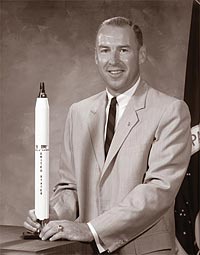
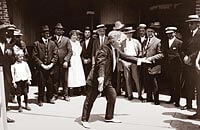
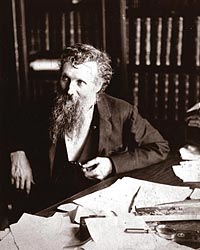



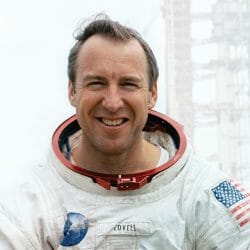

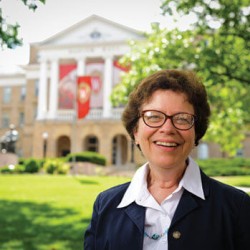
Comments
No comments posted yet.